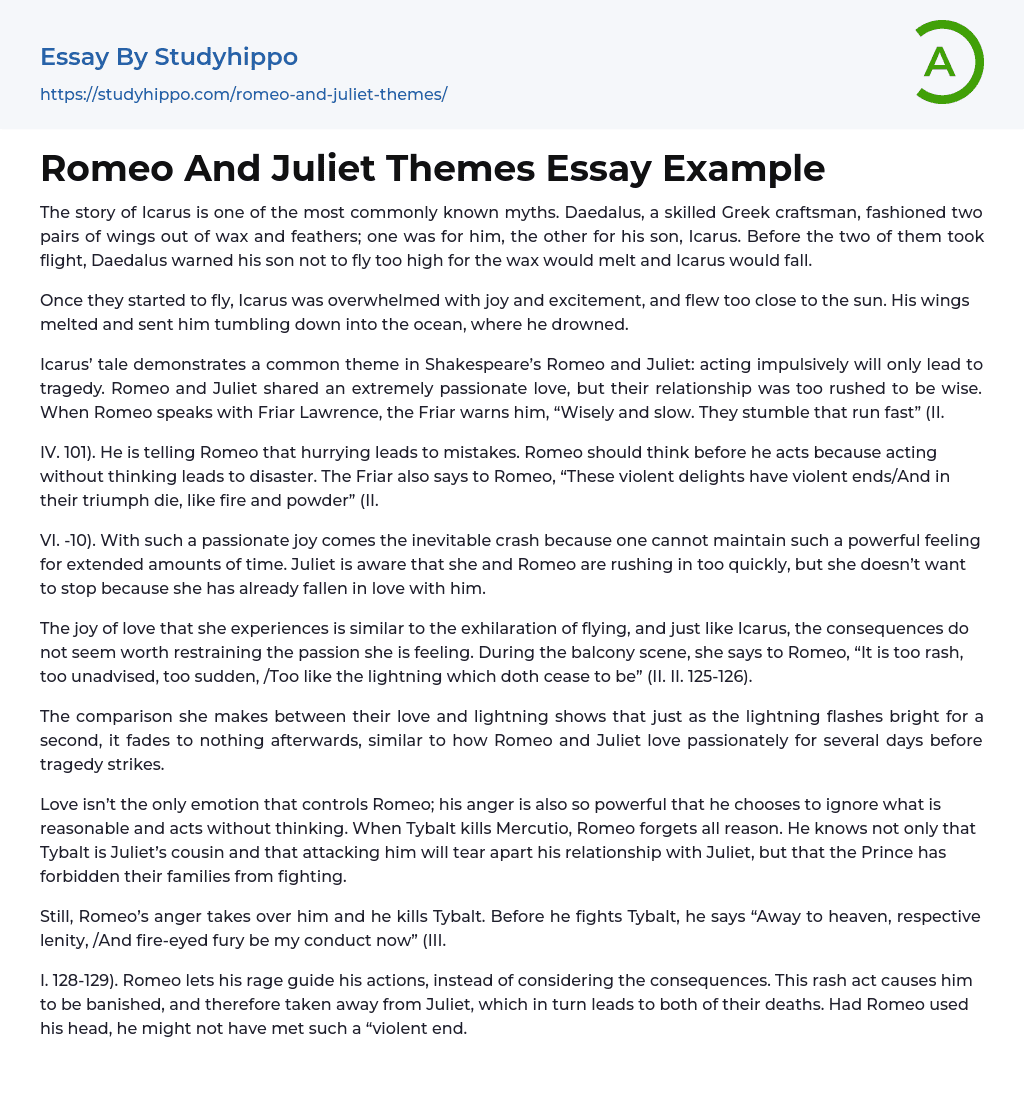The story of Icarus is one of the most commonly known myths. Daedalus, a skilled Greek craftsman, fashioned two pairs of wings out of wax and feathers; one was for him, the other for his son, Icarus. Before the two of them took flight, Daedalus warned his son not to fly too high for the wax would melt and Icarus would fall.
Once they started to fly, Icarus was overwhelmed with joy and excitement, and flew too close to the sun. His wings melted and sent him tumbling down into the ocean, where he drowned.
Icarus’ tale demonstrates a common theme in Shakespeare’s Romeo and Juliet: acting impulsively will only lead to tragedy. Romeo and Juliet shared an extremely passionate love, but their relationship was too rushed to be wise. When Romeo speaks with Friar Lawrence, th
...e Friar warns him, “Wisely and slow. They stumble that run fast” (II.
IV. 101). He is telling Romeo that hurrying leads to mistakes. Romeo should think before he acts because acting without thinking leads to disaster. The Friar also says to Romeo, “These violent delights have violent ends/And in their triumph die, like fire and powder” (II.
VI. -10). With such a passionate joy comes the inevitable crash because one cannot maintain such a powerful feeling for extended amounts of time. Juliet is aware that she and Romeo are rushing in too quickly, but she doesn’t want to stop because she has already fallen in love with him.
The joy of love that she experiences is similar to the exhilaration of flying, and just like Icarus, the consequences do not seem worth restraining the passion she is
feeling. During the balcony scene, she says to Romeo, “It is too rash, too unadvised, too sudden, /Too like the lightning which doth cease to be” (II. II. 125-126).
The comparison she makes between their love and lightning shows that just as the lightning flashes bright for a second, it fades to nothing afterwards, similar to how Romeo and Juliet love passionately for several days before tragedy strikes.
Love isn’t the only emotion that controls Romeo; his anger is also so powerful that he chooses to ignore what is reasonable and acts without thinking. When Tybalt kills Mercutio, Romeo forgets all reason. He knows not only that Tybalt is Juliet’s cousin and that attacking him will tear apart his relationship with Juliet, but that the Prince has forbidden their families from fighting.
Still, Romeo’s anger takes over him and he kills Tybalt. Before he fights Tybalt, he says “Away to heaven, respective lenity, /And fire-eyed fury be my conduct now” (III.
I. 128-129). Romeo lets his rage guide his actions, instead of considering the consequences. This rash act causes him to be banished, and therefore taken away from Juliet, which in turn leads to both of their deaths. Had Romeo used his head, he might not have met such a “violent end.
” In accordance with the theme of impulsivity, I would choose to set Romeo and Juliet in December 1969, at the infamous Altamont Speedway Free Festival.
The rock concert, featuring many popular rock bands including the Rolling Stones, drew a wild and unruly crowd and used the Hells Angels as security guards. Once the Rolling Stones took the stage, there was an outburst
in the crowd. A man tried to climb on stage and was stabbed to death by one the Hells Angels guards.
This scene is perfect for Romeo and Juliet because it exemplifies acting without thinking or considering the consequences. Not only did the guard kill the man without thinking about what he was doing, the victim also acted impulsively. At the time of his murder, the victim was high and stupidly tried to climb on stage.
Although he could not have predicted it would lead to his death, he should have known that climbing on stage would not have a great outcome for him. The victim’s situation is similar to that of Romeo because they both made impulsive decisions that ultimately lead to their deaths. Perhaps if they had stopped to think about what they were doing, they would have lived longer lives.
Sometimes feelings simply take control of people. The anger, love, happiness, or grief grips them, and invades their mind and feelings until they are so consumed with passion that all reason leaves them.
Romeo was so in love with Juliet that nothing besides continuing his love mattered. Once a new feeling overtook him, he forsook all other thoughts to let out his rage on Tybalt.
The powerful emotions caused him to forget any warnings of danger. Happiness did the same to Icarus. The feeling of soaring and flying was so overwhelming to him that he forgot his father’s warning and fell into the sea. His story, like Romeo’s, should be a lesson that impulsivity can lead only to misfortune.
“Therefore love moderately. Long love doth so. Too swift arrives as tardy as
too slow. ” (II. VI. 14-15)




